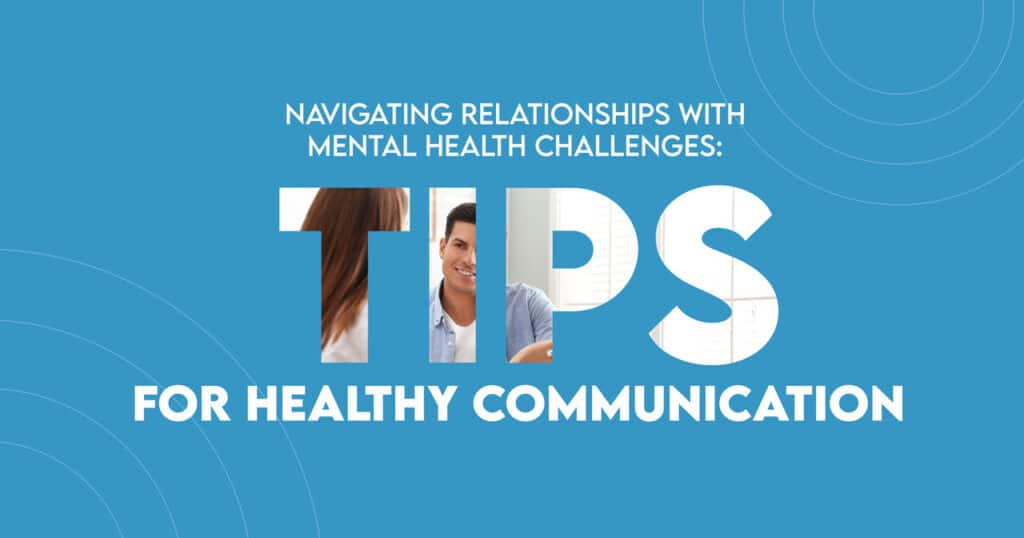Navigating mental health challenges like anxiety or depression is already tricky, but when relationship issues are added to the mix, it can feel even more overwhelming. Effective, open communication is essential for understanding your feelings and maintaining healthy connections with those around you.
Essential Takeaways
- Open communication is Key: Talk about mental health issues early and often and provide a safe space for honest discussions. Active listening and empathy are also tools that will foster understanding.
- Set Healthy Boundaries: The mental health scenario strains relationships if boundaries aren’t clear. Both partners must ensure their needs are respected, maintaining a good balance between support and individuality.
- Seek Professional Help When Needed: Sometimes, outside help is necessary. Couples therapy can provide a neutral space to discuss complex topics and develop strategies for long-term success.
In this guide, we’ll explore the unique dynamics of relationships affected by mental health issues and provide practical tips on fostering healthy communication and mutual support.
Understanding the Impact of Mental Health on Relationships
Mental health could have an impact very severely on relationships. Suppression of ill sentiments, positive interaction, and good communication skills could be affected in a person’s life if he suffers from anxiety, depression, or other mental disorders.
Mental Health and Emotional Dynamics in Relationships
Mental health conditions can influence how emotions are expressed and managed in a relationship. For example:
| Anxiety | It can cause irritability, overthinking, or excessive worry about the relationship. |
| Depression | It may lead to withdrawal, low energy, and a lack of interest in activities once enjoyed together. |
| Mood disorders | These are like bipolar disorder and can cause fluctuations in energy and mood, making it hard to maintain consistency in communication and engagement. |
The partner who isn’t dealing with the mental illness might feel left out or unsure of how to provide support, leading to misunderstandings, frustration, and increased tension in the relationship as a result of these emotional upheavals.
The Role of Stigma in Mental Health and Relationships
Stigma about mental health may cause further suffering in the relationship. They fear misinterpretation, neglect, and criticism when freely expressing themselves on various issues of concern.
Isolation will cause additional harm in the relationship since one fails to express his feelings when, indeed, he or she faces some emotional and mental health-related alienation.
Stigmatization is also very important. Only through open discussion on mental health can barriers come crashing down and increase empathy and understanding between partners.
The Importance of Communication in Managing Mental Health Challenges
Healthy or otherwise, communication is needed in any healthy relationship, but it is essential when a mental health-related issue arises. Communication between partners concerning such issues may either save or worsen their relationship.
Conversations About Integrity
It is in the early stages of marriage that frank, open discussions about mental health can frame what otherwise will occur. Mental health issues can be scary because you will be discovering your spouse’s reaction to the news. But early discussions on such matters foster understanding and trust.
Here are some tips on how to start the conversation:
- Be vulnerable: Share your experience with mental health honestly, even if it feels uncomfortable.
- Avoid making it a one-time talk: Keep mental health discussions ongoing. Mental health fluctuates, and regular check-ins can prevent misunderstandings.
- Ask for understanding: Let your partner know that you value their support, but also explain that it may be hard for them to understand what you’re going through without open communication.
Building Understanding and Empathy
Active listening involves more than just listening to your spouse talk. It entails being genuinely sensitive to their emotions and reacting accordingly, which is particularly beneficial when discussing mental health issues.
Here’s how to practice active listening:
- Focus on what they’re saying. Avoid thinking about your response while your partner is talking. Focus on their words, tone, and emotions.
- Validate their feelings. Acknowledge their emotions, even if you don’t fully understand them. Statements like “I can see this is hard for you” go a long way.
- Avoid giving unsolicited advice. Instead of jumping in with solutions, sometimes it’s best to listen and let your partner express themselves entirely and simply.
Tips for Communicating Mental Health Needs in Relationships
Communication around mental health can feel tricky, but learning how to express your needs clearly and kindly is essential for both partners.
Be Clear About Your Mental Health Needs
It’s essential to communicate your mental health needs. Being upfront about what support you require can help prevent miscommunication and frustration in the relationship.
For example:
- If you’re overwhelmed, you might say, “I’m having a hard time today and need some quiet space to recharge.”
- If you need emotional support, you might say, “I’m feeling anxious right now. Can we sit down and talk for a bit?”
The key is communicating these needs before emotions build up to a breaking point. Early communication can help prevent misunderstandings and hurt feelings.
When and How to Communicate Difficult Emotions
When expressing emotions, timing and tone are important, especially in trying times. When both partners are composed and attentive, talking about your feelings might result in a more fruitful exchange of ideas.
- Timing: Choose a time when neither of you is in the middle of an emotional episode. Wait until you can both engage in a calm, collected manner.
- Tone: Avoid a confrontational or accusatory tone. Focus on how you feel rather than what the other person did or didn’t do.
Example: Instead of saying, “You never help when I’m struggling!” try, “I’ve been feeling overwhelmed lately, and I’d love to talk about how we can work through this together.”
Using “I” Statements to Express Feelings Without Blame
“I” statements are a straightforward yet powerful communication technique that can help you express your emotions to your spouse without inciting blame or defensiveness.
For instance, try expressing, “I feel anxious when we have last-minute changes in plans,” instead of, “You make me feel anxious.”
Focusing on your experience rather than blaming your partner makes it easier for them to comprehend your viewpoint.
Strategies for Supporting a Partner with Mental Health Challenges
Supporting a partner with mental health challenges can feel overwhelming at times, but there are practical ways to offer help while maintaining a healthy relationship.
Understanding What They’re Going Through
Educating yourself about your partner’s mental health condition is one of the most important things you can do. The more you understand their struggles, the more empathy and patience you can bring to the relationship.
Here’s how to educate yourself:
- Research their condition. Read books, articles, or credible online resources to understand your partner’s condition better.
- Ask open-ended questions. Show interest in learning about their experience. Questions like, “How does anxiety affect you personally?” allow for deeper discussions.
Encouraging Healthy Coping Mechanisms
Partners can significantly contribute to encouraging healthy coping mechanisms. However, it’s essential to be supportive without being overbearing.
Here are some ways to help:
- Encourage therapy. Encourage your partner to seek professional help if they haven’t already. Therapy can provide them with coping skills and support.
- Offer to participate. If your partner feels comfortable, offer to attend therapy sessions together or practice mindfulness exercises as a couple.
Being Patient and Avoiding Common Pitfalls
Patience is key when navigating mental health challenges in relationships. Giving your partner space to heal without trying to fix their problems yourself is important. Avoid these common pitfalls:
- Offering unsolicited advice. While well-intentioned, offering solutions without being asked can make your partner feel invalidated.
- Minimizing their feelings. Phrases like “It’s not that bad” or “You’ll be fine” can be dismissive, even if you mean well.
Creating a Safe Environment for Mental Health Conversations
A safe, judgment-free environment is essential for discussing mental health challenges in relationships.
Setting Boundaries and Respecting Them
Boundaries are essential for both partners, especially when one person is dealing with mental health challenges. Discuss and establish boundaries that feel comfortable for both of you, such as:
- Alone time. Respect your partner’s need for solitude when feeling overwhelmed.
- Communication frequency. Decide how often you’ll check in with each other about mental health so it doesn’t feel like a constant topic of conversation.
Building Trust Through Transparency
Trust is developed when both partners are open and honest about their needs, wants, and challenges. Even in awkward situations, being honest with one another improves your relationship and makes it simpler to deal with mental health issues as a couple.
Maintaining Emotional Intimacy Despite Mental Health Challenges
Even though it can be challenging, maintaining emotional intimacy can still be achievable when facing mental health issues. Couples can maintain emotional closeness even in trying circumstances by concentrating on connection.
The Role of Physical Affection in Healing and Comfort
Hugs and handshakes are physical affection that can ease discomfort and reinforce emotional ties during trying times. When words alone aren’t enough, physical proximity can occasionally express the caring and support that words cannot.
Quality Time and Shared Experiences
Spending quality time together, even if it’s just through straightforward activities like taking a stroll or watching a movie, can facilitate a feeling of connection. Relatable experiences that don’t involve mental health issues are crucial to maintaining the partnership.
The Importance of Self-Care for Both Partners
Mental health challenges affect both partners—they don’t just affect the person experiencing them. That’s why both individuals need to practice self-care.
Avoiding Burnout as a Caregiver or Supporter
Supporting a partner with mental health issues can be emotionally exhausting. Make sure to prioritize your mental health as well:
- Take breaks. It’s okay to step back when you need time to recharge.
- Seek support. Consider joining a support group for partners of people with mental health conditions.
Encouraging Independence in Your Relationship
While support is crucial, each partner needs space to develop independently. Supporting your partner in pursuing their interests, connections, and activities can help maintain a healthy and balanced relationship.
When to Seek Professional Help Together
Sometimes, professional help is necessary for navigating mental health challenges in relationships.
Benefits of Couples Therapy for Mental Health Communication
Couples counseling is a valuable strategy for enhancing mental health communication. A therapist can support you and your partner in developing techniques for mutual support, navigating challenging talks, and setting appropriate limits.
Signs It’s Time to Seek Help Together
It could be time to get professional assistance if you’re experiencing ongoing disagreement, emotional distance, or trouble handling mental health issues as a couple. A therapist can offer direction and a safe location to work through problems.
FAQs
- How do I talk to my partner about their mental health?
Approach the conversation with empathy. Choose a calm moment to express your concern. Ask how you can support them, and avoid giving unsolicited advice.
- Can mental health challenges cause relationship problems?
Yes, mental health issues can impact communication, emotional intimacy, and overall relationship dynamics. However, with healthy communication and support, these challenges can be navigated.
- How can I support my partner without overwhelming them?
The key is to listen actively, respect their boundaries, and avoid trying to “fix” their problems. Encourage professional help if necessary, and practice patience.
- What should I do if my partner’s mental health is affecting my well-being?
It’s essential to prioritize your mental health. Consider seeking therapy, setting boundaries, and practicing self-care to avoid burnout.
- When should we seek couples therapy for mental health issues?
If you’re struggling to communicate effectively, experiencing ongoing conflict, or feeling emotionally distant, couples therapy can be a valuable resource to help navigate these challenges.








